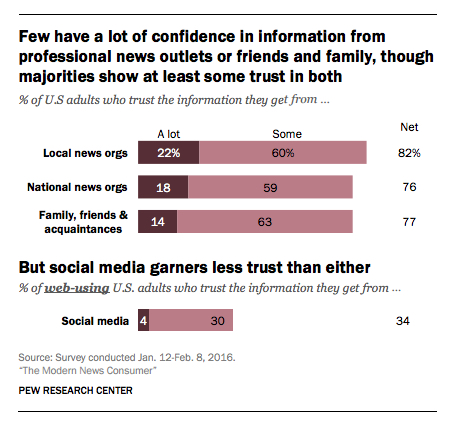The Pew Research Center’s new survey on modern news consumption trends, conducted in partnership with the Knight Foundation (which also provides funding to Nieman Lab), shows that, when it comes to news consumption, the old and young look very different. While 54 percent of 18- to 29-year-olds say that prefer to get their news digitally, just 38 percent of those ages 30 to 49 and 15 percent of those ages 50 to 64 say the same.
 The disparity in the news consumption preferences of the old and young is even more clear when it comes to mobile. Seventy percent of 18- to 29-year-olds say they prefer to only get news on mobile devices. That number declines to 53 percent of people ages 30 to 49 and 29 percent of those between the ages of 50 and 64. (Mobile news consumption on the whole is rising, though: Around 72 percent of respondents said that they get news on mobile devices. That’s up from 53 percent in 2013.)
The disparity in the news consumption preferences of the old and young is even more clear when it comes to mobile. Seventy percent of 18- to 29-year-olds say they prefer to only get news on mobile devices. That number declines to 53 percent of people ages 30 to 49 and 29 percent of those between the ages of 50 and 64. (Mobile news consumption on the whole is rising, though: Around 72 percent of respondents said that they get news on mobile devices. That’s up from 53 percent in 2013.)
These generational differences could spell bad news for the TV business. Pew’s report confirms what most television networks already have seen in their own audience numbers: Viewership among young people is sinking. While 72 percent of people between 50 and 64 and 85 percent of those over 65 say they get their news from TV, just 29 precent of 18- to 29-year-olds say the same.
Pew only surveys people 18 and older, which leaves out a significant number of younger news consumers with their own unique set of preferences for how they like to get news. It’s likely, though, that those preferences spell bad news for traditional media.
Here are some other highlights from the report:
— More bad news for publishers trying to get people to watch their news videos online: Pew found that, for people who prefer watching the news, 80 percent say they would rather do so on TV. The web, in contrast, has attracted those who want to read the news, not watch it. Previous research from Oxford’s Reuters Institute for the Study of Journalism also discussed digital news organizations’ challenges in getting people to watch news video online.
— Print, as you might expect, continues its decline: Only 20 percent of people say they get their news from print newspapers, down from 27 percent three years ago. Only 26 percent of people who prefer to read the news prefer to do so via print newspapers.
 — People who get their news online are more likely to have a negative opinion of the media. Around 67 percent of people who prefer to consume news online have a positive opinion on the media, compared to 81 percent of people who prefer other platforms. Young adults, in particular, are more negative about the media in general.
— People who get their news online are more likely to have a negative opinion of the media. Around 67 percent of people who prefer to consume news online have a positive opinion on the media, compared to 81 percent of people who prefer other platforms. Young adults, in particular, are more negative about the media in general.
— News, overall, seems to have a trust problem: Only 20 percent of Americans trust the information they get from online and offline news organizations. Trust in news from social media is even lower, Pew found, echoing the findings of an April report from AP-NORC Center for Public Affairs Research and the American Press Institute.
The full report is here.